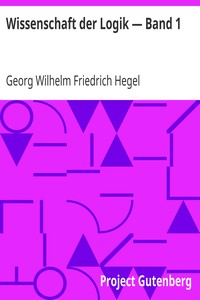| Summary |
"Wissenschaft der Logik — Band 1" by Georg Wilhelm Friedrich Hegel is a scientific publication written in the early 19th century. This work serves as Hegel's profound exploration of logic and metaphysics, particularly focusing on the nature of being, existence, and their fundamental properties. It attempts to redefine the principles of logical thought, emphasizing a dialectical method that serves as a framework for understanding essence and reality. At the start of the text, Hegel introduces a new perspective on logic, emphasizing its necessity in the evolution of philosophical thought, which has undergone significant transformation in recent decades. He discusses the historical decline of traditional metaphysics, arguing that it has effectively lost relevance in contemporary philosophical discourse. Hegel critiques past approaches, particularly those that treat logic as merely formal and devoid of substantive content, and asserts that a genuine philosophical method must engage deeply with the inherent content of thought, leading to an understanding of the dialectical process of reasoning. This dialectical method seeks to unfold the intricate relationships between basic logical concepts such as being, nothing, and becoming, setting the stage for a comprehensive treatment of logic that will follow in the subsequent sections of the book. (This is an automatically generated summary.)
|

